
PUMPA - SMART LEARNING
எங்கள் ஆசிரியர்களுடன் 1-ஆன்-1 ஆலோசனை நேரத்தைப் பெறுங்கள். டாப்பர் ஆவதற்கு நாங்கள் பயிற்சி அளிப்போம்
Book Free DemoThe Arrival of British:
The British announced their arrival with a victory over Nawab of Bengal and their French counterparts in the decisive Battle of Plassey in 1757. This victory enabled them to extend their economic and political dominance over many parts of the country. Many landlords lost their power over their lands which naturally agitated them, and fought against the British.
Battle of Plassey
The British East Indian Company started to collect the annual tributes from the local chieftains called Palayakkarars, who picked the resistance against the British by denying them their annual tribute. The first among them was Puli thevar, and later many followed his path.
*FACT FILE: Battle of Plassey: The battle was fought between British forces led by Robert Clive against the Nawab of Bengal (Siraj-ud-Daula), which took place on the banks of Hooghly river in 1757 in which the British emerged victoriously.

Battle of Plassey
The Birth of Palayams:
Palayakarars are local chieftains appointed by the Nayaks, who the kings appointed to maintain their provinces. One such instance where the Vijayanagar rulers appointed Nayaks. Vishwanatha, who became the Nayak of Madurai, appointed Palayakkarar to maintain his province in 1529.
The local chieftains demanded more powers, and hence Vishwanatha brought in place the system of Palayakkarars with the aid and advice of his minister Ariyanatha Muthaliar in 1529. Thus, a group of local power named Palayakkarars came into reality.
*FACT FILE: Palayakkarars: The rulers of the territories or palayams came to be known as Palaykkarars, who held their positions under the role of military assistors to their heads (Nayaks).
Roles of Palyakkarars:
- Collection of taxes (where the collected taxes will be split among the Nayaks, the Palayakkarars and the army).
- Maintaining the army.
- Defending the territories of Nayaks.